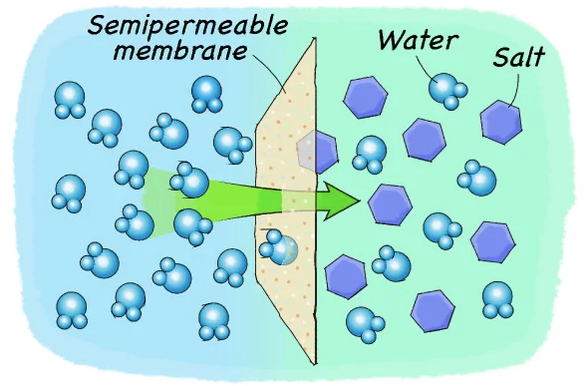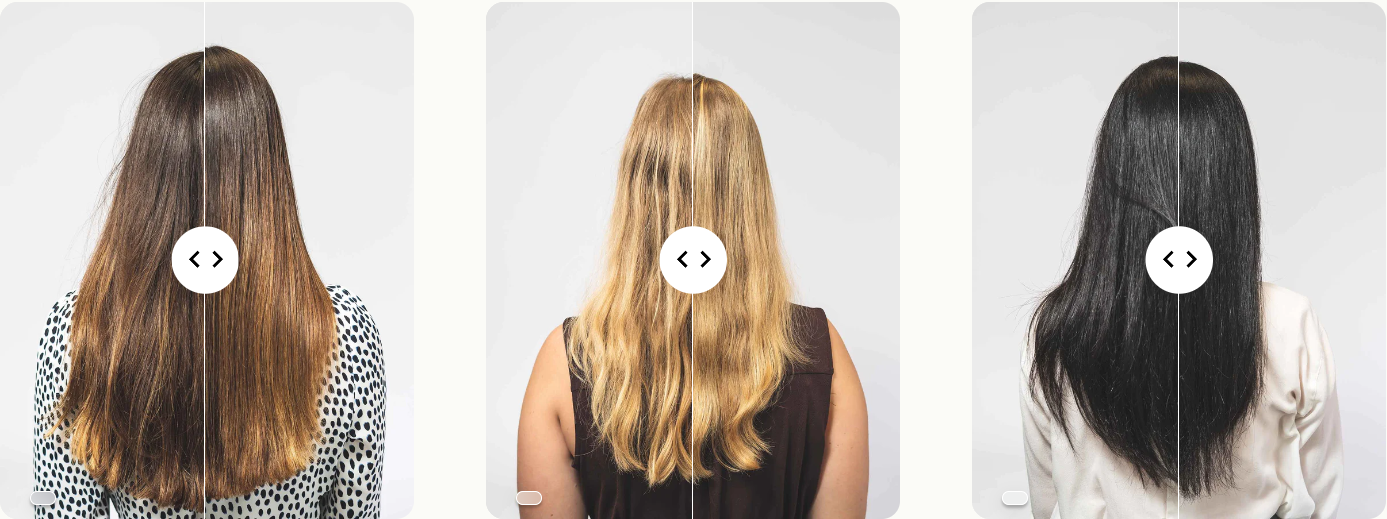You probably have seen that social media post where someone went for a dip in the Dead Sea and their hair becomes dry and brittle to touch.
Swimming in the sea is a good way to get those relaxed beach-y waves and some extra volume. But it as great as it can make our hair look, it might be a double-edged sword if precautions are not taken.
In this article, we'll be looking for the answer to whether salt water is good or bad for your hair.
Table of content
What is sea water composed of?
Sea water is mostly composed of water together with 2,5 % - 3,5 % salt (sodium chloride) and smaller amounts of other substances.
Talking about the salt in seawater, it is much more complicated than you may think. It comes from diverse mineral deposits that are dissolved in seawater through the water cycle.
Besides sodium and chloride ions, 92 other elements are present to some extent (see Figure 1). These ions are derived from various activities including the internal chemistry of the ocean, the dissolving of biological materials, sediments from the bottom of the sea, and the runoff from the land.
Salinity, or the amount of salt in seawater, varies depending on the specific location.

Figure 1: Major constituents of salt water (Source: NASA Salinity)
As your leading source for hair health information over the past 4 years, we never compromise on accuracy. When it comes to your health, you deserve information you can truly rely on - and earning your trust is our top priority.
Here's how Scandinavian Biolabs ensures every piece of content meets the highest standards of accuracy and integrity:
- Credentialed Experts: Our reviewers are actively practicing doctors and medical researchers
- Stringent Reviews: Content undergoes rigorous editing by subject specialists and review by a practicing doctor.
- Evidence-Based: We rely on well-established research from trusted scientific sources like peer-reviewed journals and health authorities.
- Full Transparency: Our editorial standards, writer credentials, reviewer credentials, correction process, and funding are all publicly documented.
- Independent Voice: While we do promote products, we operate in a vacuum to business operations. Our main goal is just an unwavering commitment to providing medically-sound guidance.
You can count on Scandinavian Biolabs to consistently deliver the trustworthy health information you deserve. Read our Editorial Standards.
The benefits of salt water on hair
We all love that post-dip-in-the-sea look when we're on vacation, but its effortless charm, relaxed waves and, natural volume seem impossible to recreate back home. So what makes salt water so special?
Extra volume and natural waves
The crystals in salt water can add volume and body to the hair by lifting the hair cuticle, making hair look overall fuller.
Our hair is made of crosslinks and keratin proteins that determine each hair strand's shape. Salt, sodium chloride and magnesium sulfate in sea water create extra crosslinks in the hair, giving it a more wavy or curly appearance.
Anti-fungal properties
In addition to creating the popular beach-y look, salt water also has anti-fungal properties. Occasional wash in salty water can help you to get rid of excess oil, thus helping to prevent greasy hair. The result: fresh, clean scalp and hair.
Eco-friendly exfoliator
You get a free, natural exfoliation for your scalp by swimming in the sea. The mineral-rich seawater crystals may function as an excellent exfoliant for your scalp, removing product buildup from hair roots and stimulating blood flow.
How does salt water damage your hair?
Seawater has a high concentration of minerals and vitamins, which helps to detoxify the skin, reduce swelling, and treat wounds, among other things. However, it is important to acknowledge its potentially harmful effects on your hair.
First of all, we should agree that average exposure won’t hurt. It is even beneficial if you take advantage of seawater properly. But constant saltiness combined with an increase in temperature during the summer may lead to damage and dryness.
Moisture-wicking
Your hair, like your skin, is soft, elastic, and moisturised due to its high water content, and it can become dehydrated when too much moisture is lost.
Sea salt can draw moisture out of hair in a similar way that chlorine does in swimming pools. The chlorine strips away natural oils, leaving hair dry and damaged.
You could notice that blow-drying your hair will take longer, or that curling or maintaining a style is challenging after you visit the beach. Being stripped of its natural oils and losing moisture, hair becomes dry, brittle, and more fragile. This is an issue even if you have oily hair.
Strand-twisting and frizzing
Moreover, saline water could disturb different bonding interactions inside hair strands and create additional cross-links. Thus, beyond giving your beautiful beach waves, salt water could also impair your hair strength, and eradicate its shine and smoothness.
Hair-splitting
In its most extreme form, besides dandruff, saltwater damage also causes hair to split at the ends and leads to breakage. These effects are even worse on dyed or processed hair .
If you have coloured hair, saltwater damage not only gives it a rough texture but can alter its colour as well. So remember to take extra care of your dyed hair .
Without proper treatments, after several months of summer, your hair can turn lifeless, snarled, and harsh to the touch.
How does salt water cause damage?
Here are the mechanisms in which salt can cause damage.
Hair shafts swelling with water
Hair is permeable to water, implying that too much swimming can enhance water penetration into hair. If the hair cuticle is already damaged or over-porous, repeated wetting may cause a negative impact on the hair shaft condition.
When immersed in the sea, your hair swells with water, given that the protecting effect of the cuticle is already inhibited by prior impairment.
Its repeated expansion and contraction gradually weaken the hair. In addition, swimming could also hurt hair cuticles by friction with the water.
The osmosis effect
The process of moving water across a semipermeable membrane (a type of barrier that lets certain particles pass through while blocking others) to balance the solute concentrations between two areas is called osmosis.
When your hair submerges in seawater, there is a difference in the salt concentrations between the water within your hair and the salt water surrounding it. Thus, a reaction happens where water moves from an area of lower salt concentration (your hair) to an area of higher salt concentration (salt water).
In turn, this procedure removes moisture from the interior of your hair strand, leaving it dry and brittle. Furthermore, in the condition of lacking moisture, hair is more prone to flyaways, or in other words, frizzing.

Figure 2: The osmosis process (Credit: George Retseck)
Increasing hydrogen bonds and salt crystals
When you swim on the beach, the keratin protein becomes dehydrated. Such dehydrated environment enables molecules in salt water to enter the hair fiber, breaking up the hair’s preset hydrogen bonds and forming new ones.
Therefore, you will need more time to blow-dry your hair and any styling work is much more difficult after a visit to the beach.
After swimming, the salt in seawater could leave behind hard crystals on your hair which further develops mechanical abrasion to the cuticle. You can notice the rougher hair surface as a result of these crystals. Tangling increases as well when adjacent hairs are more prone to get caught together.
Does sea salt cause hair loss?
For most people with healthy hair, moderate salt use does not appear to lead to hair loss. However, high sodium content can dry and dehydrate hair strands, which can lead to damage and breakage, leading to a thinner, less healthy appearance. It can also dry out scalp when exposed excessively which can lead to scalp issues.
How to protect your hair from sea water?
We have discussed the pros and cons above, but it can be hard to sacrifice swimming in the cooling waves for your hair.
We have just the hair care tips so you don't have to choose between having some summer fun and your locks.
Here's 10 best ways how to protect your hair from saltwater:
- Apply a leave-in conditioner or hair mask
- Wear a tightly fitting swim cap
- Rinse hair with fresh water
- Use a water-resistant hair products
- Towel dry hair gently
- Deep condition weekly
- Avoid swimming for extended time at the beach
- Only shampoo hair when necessary
- Air dry naturally
- Use sea salt sprays to mitigate damage
Apply a leave-in conditioner or hair mask
Look for a product rich in moisturising ingredients like oils, butters or nutrients to coat and protect each strand after swimming. This seals in moisture that would otherwise be lost to chlorine or saltwater damage.
Wear a tightly fitting swim cap
Opt for a cap made from latex, silicone or lycra that forms a barrier between your hair and chemicals in the water. The snug fit prevents water from seeping in. Consider double-capping for extra protection.
Rinse hair with fresh water
Use cool or lukewarm water from the shower or tap to rinse ocean water from hair. This washes away residual chemicals that continue damaging hair if left on. Focus the stream on hair and scalp for at least 5 minutes.
Use a water-resistant hair care product
Apply a cream, gel or flexible-hold spray before swimming that withstands water immersion without rubbing or washing off. Reapply as needed to maintain style without fussing with hair at the beach or pool.
Towel dry hair gently
Wrap hair up instead of vigorously rubbing with a towel, which can cause breakage. Blot with the towel to remove surface water, then pat sections to squeeze out remaining moisture without friction damage.
Deep condition weekly
Choose a rich mask treatment (maybe with epsom salt) to hydrate, restore protein balance and add sheen. Apply abundantly to ends and let sit with a plastic cap for at least 20 minutes before rinsing for maximum benefit.
Avoid swimming or extended time at the beach
Limit pool or ocean activities to 30 minutes or less at a time when possible. Prolonged exposure allows harmful byproducts to build up in hair cuticle layers over multiple dips.
Only shampoo hair when necessary
Shampoo removes protective oils too frequently, leaving strands vulnerable to sun/water damage. Wait 2-3 days between washes unless hair becomes visibly product-heavy or smelly.
Air dry naturally
Allow hair to dry at its own pace without blasting heat that might worsen damage. Sections dry at different rates naturally without risk of over-drying some parts.
Use sea salt sprays to mitigate risks
If you love that relaxed beach-y look but don't want to constantly expose your hair to the potential risks of sea water, a high-quality sea salt spray can be a more controlled way to achieve your desired look. Make sure to pick a product that contains hydrating ingredients and antioxidants that can help balance out the damaging effects of the salt content.
Conclusion
The answer to the question “Is salt water good for your hair?” is a resounding “it depends”.
On one hand, salt water or ocean water can help add natural volume and body, exfoliate the scalp and reduce greasiness.
On the other hand, it can strip off moisture and cause drying without the appropriate precautions.
Therefore, we recommend using protective hair oils, deep-conditioning regularly, or opting for sea salt sprays with added nourishing ingredients.
EDITOR'S PICK:
- Does Lack Of Sleep Cause Hair Loss?
- The Truth About Caffeine Shampoo You Should Know!
- Mature Hairline: What Is It & How To Handle
Bonus tip!
Why not double down on hair protection and get yourself our Hair Protection Oil?

References
https://biologydictionary.net/osmosis/
https://salinity.oceansciences.org/science-salinity.htm
Robbins CR, Chemical and Physical Behaviour of Human Hair (5th ed), 2012 . DOI: 10.1007/978-3-642-25611-0 .
Chester, Jickells, Roy, Tim (2012). Marine Geochemistry. Blackwell Publishing. ISBN 978-1-118-34907-6.
Tur E (ed): Environmental Factors in Skin Diseases. Curr Probl Dermatol. Basel, Karger, 2007, vol 35, pp 103–117.
Dr Amy Revene M.B.B.S. graduated from the University of Sharjah in the United Arab Emirates. She is currently working as a General Physician at New Hope Medical Center. Amy has a passion for research and offers her expertise and opinions to help people in their quest to lead healthy, happy lives.








